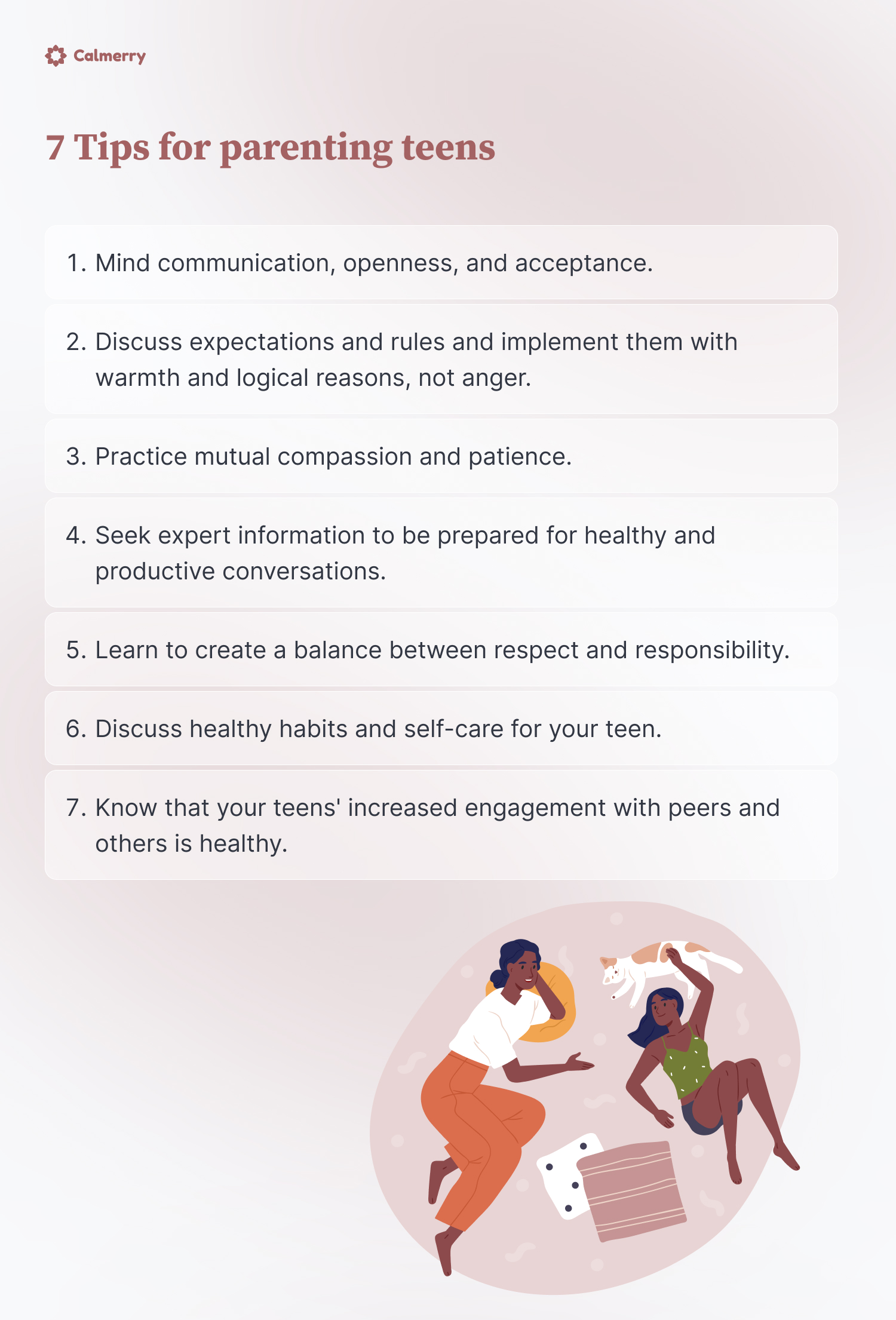Parenting Teens: 7 Tips for Parents and Caregivers to Navigating the Teen Years

In this article
The good news is, studies show that parents who try to create a positive relationship with their young adolescents set the stage for a better relationship with their children as they become adults. [1] Fang, S., Fosco, G. M., Redmond, C., & Feinberg, M. E. (2022). Multivariate growth trajectories of parenting practices in adolescence predicting young adult relationships with parents. Developmental Psychology, 58(12), 2388–2400. https://doi.org/10.1037/dev0001443
Parenting adolescents can present many challenges. How these challenges impact each adolescent and their family is unique.
When parenting a teenager, it’s important to note not every teen has problems. Parents should not automatically project difficulties onto their teens’ experiences.
– Arabel Elliott, Master of Social Work (MSW)
There are potential areas of conflict when parenting adolescents that you can make yourself familiar with and learn to address to help navigate when issues do arise.
Disagreement is not necessarily bad, and parent-teen conflict will arise as it does in any close relationship. This can effectively be met with open communication, mutual respect, firm guidelines, and understanding.
Parenting today’s teens is not easy and requires a balance. By acknowledging teens’ increased independence, maintaining guidelines, and helping teens practice good communication, parents can often ease conflicts and problems.
Potential areas of parent-teen conflict
Below are typical areas where the biggest changes occur for teens that can lead to parent-teen conflict:
- Teens are struggling to define who they are, shrugging off childhood interests and exploring new ways to carve out their own identity. This can leave parents raising a teenager yearning for who their child was and unprepared to accept who their teen is becoming.
- Teens are frequently confused, not knowing who they are or where they belong during this phase of life, no longer children and not yet adults. They are left trying to form their own identity and yet still “fit in” with peers. This can often lead to rapid and seemingly illogical moodiness.
- Nearly a third of adolescents aged 13-18 experience some form of anxiety. Anxiety Disorders are among the most common mental health issues in the United States Having specific information about anxiety in teens, how it might manifest itself differently, and how parents can help is a powerful tool for families.
- The teen years included unprecedented changes in brain chemistry and adolescent bodies. This can manifest itself in impulse control problems that often exacerbate other issues.
- Lack of impulse control, a fierce need to create their own identity, and other issues can lead teens to experiment with behaviors such as substance use/abuse, alcohol use/abuse, and sexually risky behaviors.
- Challenges with self-esteem and other pressures during this stage of life can trigger some teens to engage in self-injury, such as cutting themselves. Being aware of signs and forms of self-harm, and how to address it is key for parents helping teens address this issue.
- Teens may be more strongly identifying with peers in an effort to carve out who they are, but they are still very much in need of firm and loving support from parents. Research supports that firm expectations and loving support from parents lead to better outcomes for teens and decreased problems such as engaging in risk-taking behaviors.
- Parents struggling to over-control their teens’ lives may unknowingly send the message that they don’t trust the teen or their changing maturation or capability. Studies support that teens’ desire for appropriate, increased status and respect from parents and caregivers is critical to promoting positive interactions and avoiding conflict with teens. [2] Yeager, D. S., Dahl, R. E., & Dweck, C. S. (2017). Why interventions to influence adolescent behavior often fail but could succeed. Perspectives on Psychological Science, 13(1), 101–122. https://doi.org/10.1177/1745691617722620
7 Tips for parenting teens and becoming a better parent
Below are tips for teenage parenting, tailor these to the needs of each teenager, different situations, and your changing role as a parent.

1. Communication, openness, and acceptance
With a teen’s increased independence and parents busy in their daily lives, time together can decrease. Less time together results in fewer opportunities for communication.
Try making one time of day or the week “family time”. Get your teen’s input on it so they feel engaged in the process.
Teens are self-questioning in areas such as gender, faith, intellect, and relationships. Experts suggest making time to talk and, more importantly, listening to them benefits teens and their parents. [3] Staff, N. A. (2023, January 30). The Ultimate Guide to Parenting Teens: 15 Tips for raising Teens today. Newport Academy. https://www.newportacademy.com/restoring-families/tips-for-parenting-teens/
You don’t have to agree, real dialogue includes disagreement. Respect and acceptance are two-way streets, and setting a time for family to talk is an opportunity to model that.
Work on listening to your teen, and still be honest with them that final decisions remain with you as the parent.
2. Warmth and firm expectations
While teens seek to create their own identity and gain greater respect and independence, it is important to have clear and firm guidelines.
Boundaries and rules should be in line with the changing needs of your teen and your role as a parent. Discussing these with your teen can gain greater adherence to the rules, as long as teens remain aware that your decisions as the parent are firm.
– Arabel Elliott, Master of Social Work (MSW)
Confrontations will no doubt arise. Clear, consistent, and reliable expectations for teens provide a sense of security even in the midst of confrontations and changes.
Expectations and rules should be discussed and implemented with warmth, not anger, and with logical reasons.
3. Compassion and patience
As the parent of a teen, you don’t need an expert to tell you that patience is necessary, remember to be patient with yourself and your teen.
You can take a time out for yourself or ask your teen to take a break. A moment to breathe away from confrontations can restore calmness.
Your teen has greater awareness of issues, you can use that. Identifying your teen’s frustration or anger in an age-appropriate way offers two things.
You become a person, not just an authority figure, your teen knows that Mom or Dad struggles too, and it can help them deal with it.
Also, they experience you relating to them as not a young child, you acknowledge their changing status, and that is very important to them.
4. Information paired with conversation
By reading this article and others, you are doing something great. With more information, you are prepared for healthy and productive conversations.
Start with sources that you already trust, such as a family doctor, an aunt or uncle, or someone in your community of faith.
Be prepared to seek out new sources of information as well. Your changing teen has new interests and new questions. You might need new sources of information to answer questions and engage them in conversation where they are.
5. Balance of roles, respect, and responsibility
How to create a balance between respect and responsibility, with changing roles for parents and teens, is an area where conflict often arises.
Tools such as active listening can be used to let your teen know that you are hearing what they say, you can take it into account and avoid miscommunication.
When discussing, for example, a change in curfew time, reflect back to your teen the language you hear them using with phrases like “What I hear you saying is…”
Clarify, be firm and understanding, and let your teen know that you expect the same understanding in return.
Your teen needs to know that with increased respect comes the responsibility to provide that to others, including yourself.
6. Healthy habits and self-care for your teen
Teens need sleep, studies prove that good sleep and teen mental health are clearly linked. [4] Orchard, F., Gregory, A. M., Gradisar, M., & Reynolds, S. (2020). Self‐reported sleep patterns and quality amongst adolescents: cross‐sectional and prospective associations with anxiety and depression. Journal of Child Psychology and Psychiatry, 61(10), 1126–1137. https://doi.org/10.1111/jcpp.13288
Consider setting an electronics curfew in the house, for example, turning off video and electronics in the home at a certain time of night. Or try turning off all electronics 30 minutes before bedtime.
Overstimulation, visually and otherwise, with the use of video and electronic devices can interrupt or inhibit deep and healthy sleep, especially for teens.
Setting this curfew or expectation house-wide can benefit the whole family. Parents, as well as teens, are likely to see increased sleep and benefits in many areas of life.
7. Continued engagement and increased independence
Your teen is identifying more with peers – with people outside the home. It’s a natural change, and as a parent, you might be feeling confused and even sad about it.
Your teens’ increased engagement with peers and others is healthy. It does not mean your relationship with them is less important.
– Arabel Elliott, Master of Social Work (MSW)
Research supports that teens who report supportive, communicative relationships with their parents are less likely to engage in some risk-taking behaviors. [5] Ben‐Ari, O. T. –., Kaplan, S., Lotan, T., & Prato, C. G. (2015). Parents’ and peers’ contribution to risky driving of male teen drivers. Accident Analysis & Prevention, 78, 81–86. https://doi.org/10.1016/j.aap.2015.02.020
Again, it’s about the balance of increased independence for your teen with continued engagement. Your role as a parent is changing as your teen changes, it may become different, but remains crucial.
Seeking guidance and parent help with teens
For parents of teens, it can be critical to know when to seek professional therapy. Even with tips for parenting teens and all a parent’s effort, you may find yourself locked in constant conflict with your teen, repeating negative and damaging patterns of interaction and behaviors.
Calmerry is a secure online therapy platform for adults 18 and older that can provide parents with safe and reliable tools and the support they need to address conflicts or challenges that arise in raising adolescents.
By using online, professional therapy you can get techniques that are effective, useful for you as a parent, and that benefit both you and your teen in resolving ingrained problems and issues.
– Arabel Elliott, Master of Social Work (MSW)
Online therapy at Calmerry is not only safe, but it can be equally successful as in-person therapy. And it’s a more convenient and accessible way to engage with qualified professionals.
Contact Calmerry and connect with a professional today that best suits your needs. A professional can help resolve conflicts and challenges and create a healthy, working relationship between you and your teen.
Fang, S., Fosco, G. M., Redmond, C., & Feinberg, M. E. (2022). Multivariate growth trajectories of parenting practices in adolescence predicting young adult relationships with parents. Developmental Psychology, 58(12), 2388–2400. https://doi.org/10.1037/dev0001443
Yeager, D. S., Dahl, R. E., & Dweck, C. S. (2017). Why interventions to influence adolescent behavior often fail but could succeed. Perspectives on Psychological Science, 13(1), 101–122. https://doi.org/10.1177/1745691617722620
Staff, N. A. (2023, January 30). The Ultimate Guide to Parenting Teens: 15 Tips for raising Teens today. Newport Academy. https://www.newportacademy.com/restoring-families/tips-for-parenting-teens/
Orchard, F., Gregory, A. M., Gradisar, M., & Reynolds, S. (2020). Self‐reported sleep patterns and quality amongst adolescents: cross‐sectional and prospective associations with anxiety and depression. Journal of Child Psychology and Psychiatry, 61(10), 1126–1137. https://doi.org/10.1111/jcpp.13288
Ben‐Ari, O. T. –., Kaplan, S., Lotan, T., & Prato, C. G. (2015). Parents’ and peers’ contribution to risky driving of male teen drivers. Accident Analysis & Prevention, 78, 81–86. https://doi.org/10.1016/j.aap.2015.02.020
online therapy
live video session



